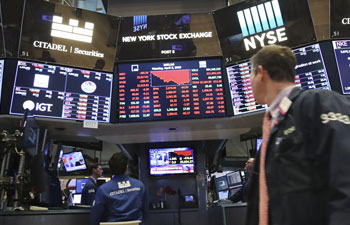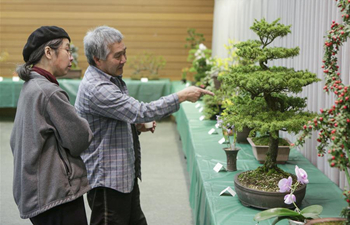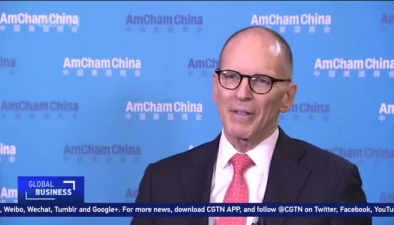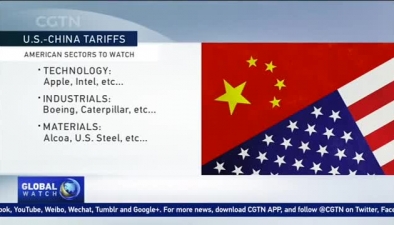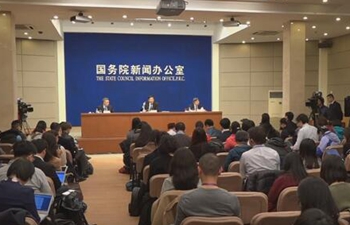LOS ANGELES, April 4 (Xinhua) -- The Los Angeles Superior Court's ruling last week that coffee sellers must put a cancer warning on coffee sold in California has left the scientific community puzzled.
"I believe in transparency but at the same time, when you put a bold declaration 'Coffee may cause cancer' when there isn't data to that effect, ... it causes panic rather than informed knowledge," David Agus, professor of medicine and engineering at the University of Southern California, told Xinhua on Wednesday.
The ruling came following a lawsuit by a nonprofit group, the Council for Education and Research on Toxics (CERT), which argued that coffee sellers in California should inform customers of the hazards of acrylamide, a flaky substance contained in coffee.
If there are no appeals against the ruling and it becomes final, it could affect thousands of coffee sellers including Starbucks, 7-Eleven, Whole Foods, Kraft, Green Mountain Coffee Roasters, and even those in local gas stations.
SCIENTIFIC CONCERNS
Scientific concerns about coffee have eased in recent years, and there are plenty of researches showing that coffee can actually prevent liver and endometrial cancers.
"Concerns about acrylamide alone should not be enough to deter people from drinking coffee," Bruce Lee, an associate professor of international health at Johns Hopkins Bloomberg School of Public Health, told Xinhua.
After reviewing more than 1,000 studies on humans and animals, the World Health Organization (WHO) stated in 2016 that there was "no conclusive evidence for a carcinogenic effect of drinking coffee."
An international working group of 23 scientists convened by the International Agency for Research on Cancer, the WHO cancer agency, has evaluated the carcinogenicity of drinking coffee.
"There is no known risk in humans for drinking coffee at the present time, and people should not be concerned over this issue," Agus told Xinhua.
"If you are a moderate coffee drinker, like a cup a day, then your exposure is not going to be that high," Lee said. "The levels that you would be exposed to are much lower than the levels that rats and other rodents were exposed to in scientific studies that showed links between acrylamide and cancer."
"Moreover, humans may metabolize acrylamide at different rates than rodents," he added.
A 2017 review found that a daily cup of coffee is associated with a reduced risk of liver cancer and endometrial cancer. Another study this year found that coffee was associated with a lower risk of death in patients diagnosed with colorectal cancer.
"At the minimum, coffee is neutral. If anything, there is fairly good evidence of the benefit of coffee on cancer," Edward Giovannucci, a nutrition expert at the Harvard School of Public Health, told media.
LONG-RUNNING LAWSUIT
CERT filed the lawsuit in 2010, claiming that coffee companies were violating California's Proposition 65, which requires warnings about potential exposure to cancer-causing elements.
Officially known as the Safe Drinking Water and Toxic Enforcement Act of 1986, it requires that businesses warn customers if the latter could be exposed to any of the over 900 confirmed or suspected carcinogens.
Judge Elihu Berle said about 90 companies which were the defendants in the case failed to meet their burden of proof.
"While (the) Plaintiff offered evidence that consumption of coffee increases the risk of harm to the fetus, to infants, to children and to adults, (the) Defendants' medical and epidemiology experts testified that they had no opinion on causation," he wrote.
It is unclear when Berle might issue a final ruling. Another phase of the case to determine whether companies should be forced to pay financial damages is still pending.
At least 13 of the defendants, including 7-Eleven, had settled the case out of court prior to the ruling, agreeing to give a warning, according to local media reports. The other companies, including Starbucks, are waiting for the final court decision.
Meanwhile, the coffee industry is mulling how to fight back.
William Murray, president and CEO of the U.S. National Coffee Association, said the industry is considering legal action.
"Coffee has been shown, over and over again, to be a healthy beverage. This lawsuit has made a mockery of Prop 65, has confused consumers, and does nothing to improve public health," Murray said in a statement.
WHAT IS ACRYLAMIDE?
French fries, potato chips, crackers, cookies, cereals and other high-carbohydrate foods contain acrylamide as a byproduct of high-temperature cooking, roasting, baking, toasting or frying.
Some studies on animals have found that exposure to high levels of acrylamide causes cancer, but there is little evidence of that in humans, Kathryn Wilson, a Harvard senior research scientist who studies links between diet and cancer, was quoted as saying.
The "probable" or "likely" carcinogen label is based on studies of animals given high levels of acrylamide in drinking water. Its effect on humans remains inconclusive, according to the U.S. National Cancer Institute.
The U.S. Environmental Protection Agency has established that the level of acrylamide in drinking water is acceptable.
The U.S. Food and Drug Administration regulates the amount of residual acrylamide in a variety of materials but there are no guidelines governing the presence of acrylamide in food itself.
On the other hand, in 2010, a Joint Food and Agriculture Organization/World Health Organization Expert Committee on Food Additives concluded that acrylamide is a human health concern. Enditem







